| Reviews & Columns |
|
Reviews DVD TV on DVD Blu-ray 4K UHD International DVDs In Theaters Reviews by Studio Video Games Features Collector Series DVDs Easter Egg Database Interviews DVD Talk Radio Feature Articles Columns Anime Talk DVD Savant Horror DVDs The M.O.D. Squad Art House HD Talk Silent DVD
|
DVD Talk Forum |
|
|
| Resources |
|
DVD Price Search Customer Service #'s RCE Info Links |
|
Columns
|
|
|
Ingrid Bergman in Sweden: 3-Film Collection
THE MOVIES:
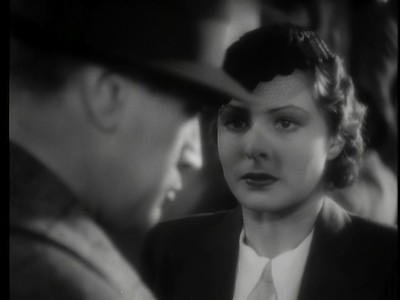
(Intermezzo)
Ingrid Bergman is a genuine Hollywood icon thanks to her co-starring role in Casablanca and her collaborations with Alfred Hitchcock. While many are aware of her later films, including the challenging Italian pictures directed by her husband Robert Rossellini, as well as her eventual pairing with the other famous Swedish Bergman, Ingmar, not as much attention is paid to her pre-Hollywood career. For a short period, Ingrid Bergman made her name as an actress in Sweden, and three of her most accomplished films from her home country are now collected in the Ingrid Bergman in Sweden boxed set--giving many of us our first chance to see a screen legend developing her craft in the earliest stages of her endeavors.
Though she had appeared in six features prior (including one uncredited role), one could argue that the 1936 version of Intermezzo (88 minutes) was really what got things started. Directed by Gustaf Molander, who co-wrote the screenplay with Gösta Stevens, Intermezzo was the movie that brought Ingrid to the attention of famed producer David O. Selznick. He would soon bring her to Hollywood and cast her in the remake of Intermezzo, her breakthrough English-language role, in 1939.
In the movie, Bergman plays Anita Hoffman, a promising young pianist who ignores better advice and pairs up with concert violinist Holger Brandt (Gösta Ekman), joining the married man as both his musical accompanist and his lover. Brandt sacrifices his home life, leaving behind his wife and two children, to go on tour with Anita, who also gives up the tutelage of Brandt's former partner (Hugo Björne). The two are essentially happy, but they practically live in exile, with Anita in the subservient role of being Brandt's back-up rather than blossoming into her own as an artist. When an opportunity to study in Paris comes up, the two must ask themselves what is really important: the love for each other, or the love of music. Brandt must also face what he's already left behind. As he puts it, they are stuck with the irony that his past and her future can never be joined.
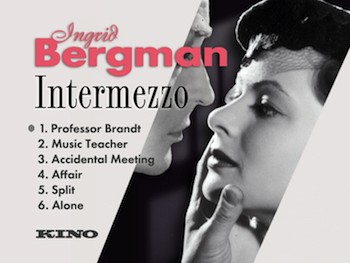
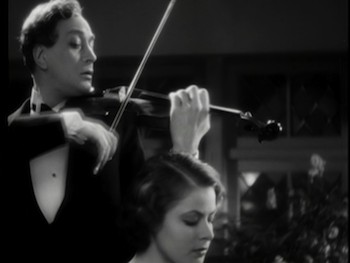
For a movie about two passionate artists locked in a scandalous affair, Intermezzo is surprisingly lacking in both passion and scandal. Its polite restraint is almost Victorian, like something akin to an Edith Wharton novel. Though solidly written, it never really gets much gas, and the inevitability of the melodrama more drifts toward its foregone conclusions than it relays any sense that there is any great force driving their fates. Thankfully, it's a film that is very well performed, with both Gösta Ekman and Ingrid Bergman making great use of their roles. They strike a fine balance, with Ekman's needy ego fitting in perfectly with Bergman's desire to please. The actress displays a sweet innocence at the start of the movie that is vastly different than some of her better-known, well-traveled roles. Intermezzo is also a pretty film to look at, with lots of intricate sets and a gorgeous wardrobe, presumably reflecting the style of 1930s Sweden.
Bergman teamed with Gustaf Molander a second time for the 1938 film A Woman's Face (96 mins.) Written again by Gösta Stevens, but this time adapted from a play by Francis De Croisset, A Woman's Face is a melodrama with a touch of noir. Bergman plays the villain of the piece--or at least, half a villain. At the start of the picture, she is the femme fatale of a blackmail ring, though her role tends to be more on the planning side than seduction. A childhood accident has left half of her face burned, and also left her bitter against the world.
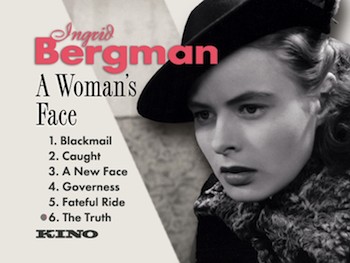
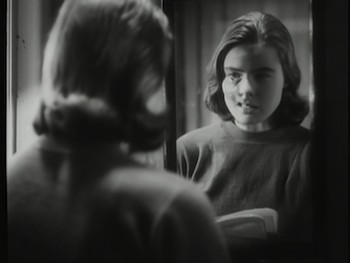
Bergman plays Anna with a surprising anger, and also a pronounced vulnerability. She regularly reaches her hand up to her face, protectively shielding her scars. She projects her rage outwardly, pushing her crew to be tougher on their victims, and ends up taking one of the cases over herself. She is caught by the mark's husband (Anders Henrikson), who by no small coincidence is a doctor who fixed similar scarring for soldiers after World War I. He offers to operate on Anna's face, hoping it will warm her heart and inspire her to turn her life around. At first, she ignores the opportunity the healed visage offers, joining a previous scheme to cheat a young boy (Göran Bernhard) out of his inheritance, but posing as his governess helps her embrace love--particularly when she finds it with one of his uncles (Gunnar Sjöberg).
Anna's transformation from hard-bitten criminal to tenderhearted softie is a predictable one, but it's made believable by Ingrid Bergman's performance. She instinctively understands the various stages of Anna's metamorphosis and her work actually stands apart from the script, which I think expected the switch to be more automatic. Despite the fairly standard plotting, A Woman's Face avoids the treacle, never quite giving in to more conventional urges, instead settling on an ending that is more bittersweet than one might expect. I haven't seen the remake with Joan Crawford that came a couple of years after Molander's version, but knowing the Hollywood formula, it wouldn't surprise me if it took an entirely different exit than the Swedish production.
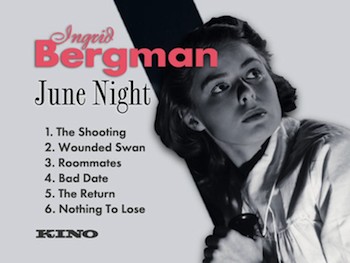
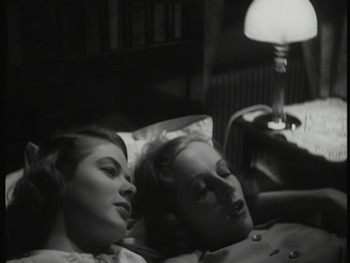
The final film in the set is also the last film Ingrid Bergman made before moving to Hollywood: June Night (1940; 85 mins.) This Per Lindberg picture is pretty straight soap opera, with Bergman playing a girl named Kerstin, who, in the movie's first scene, is shot by her boyfriend (Gunnar Sjöberg) when she tries to walk out on him. A trial and small-town scandal follows, and so Kerstin changes her name and moves to Stockholm to start over. She swears off her wanton ways, but this new leaf will be tested when she catches the eye of a handsome doctor (Olof Widgren) and also runs across the nosy reporter (Hasse Ekman) that sensationalized her story and dubbed her "the wounded swan." Both men become obsessed with her, and both are dating galpals of Kerstin's--the nurse (Marianne Löfgren) that helped her when she got to Stockholm and one of Kerstin's roommates (Marianne Aminoff). All these affairs come to a head the night the shooter comes to visit and the many romantic lines intersect.
June Night is a little slow. The script, written by Ragnar Hyltén-Cavallius from a novel by Tora Nordström-Bonnier, relies heavily on coincidences and never delves very far into its characters. Unfortunately, this is especially true for Kerstin, who gets less introspection and development than the side characters; Bergman's charisma and screen presence are all that fuel the portrayal, and the actress brings a gravitas to the role that wouldn't otherwise be there. I suppose Lindberg and Hyltén-Cavallius could be striving to make Kerstin an unknowable and mysterious figure, which might lend some explanation to why everyone is so fascinated by her (and why she does so much damage without even trying), but if so, it doesn't really work.
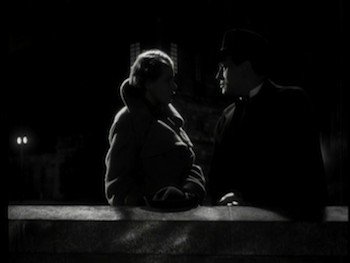
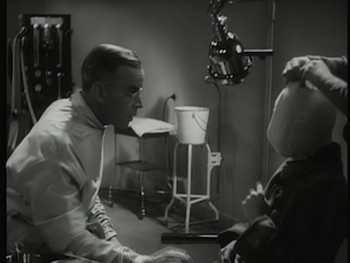
(Intermezzo; A Woman's Face)
THE DVD
Video:
Kino releases the 3-disc Ingrid Bergman in Sweden set as a fairly rudimentary collection. Each disc comes in its own slimline case, and they in turn are housed in a cardboard slipcover. Each DVD has very basic menus--just a chapter listing, no other set-up options. There aren't even many chapters: only six for each film.
The movies are all in black-and-white and presented at full frame, 1.37:1. The picture quality is fundamentally solid, with a clear image and a minor amount of digital noise. They aren't overly perfect transfers--Intermezzo has some shaky scenes and also some shots where the resolution is soft; A Woman's Face is mostly crisp, but sometimes has horizontal or vertical lines running across the screen--but these are pretty good for rare, little seen movies of this kind.
Sound:
The three films are in Swedish with embedded English subtitles. The two-channel mixes are good, but like the video, inconsistent at times. You will notice some static as well as the occasional brief scene where the audio almost sounds underwater. Intermezzo has stuttery moments where the sound goes in and out, and A Woman's Face has a consistent background hiss. Overall, though, these are good soundtrack mixes that come through clear and without too much to complain about.
In both audio and visual specs, June Night probably scores the best, with very little sign of the glitches and bugaboos seen in the others.
Extras:
Outside of a paper insert with a short essay about Bergman, nothing.
FINAL THOUGHTS:
I love Ingrid Bergman, and though the boxed set Ingrid Bergman in Sweden doesn't represent the best her filmography has to offer, it's still Recommended for fans who want to see some of her earliest work. The iconic actress only made a handful of pictures in her native homeland, and the trio here represents the period where she hit her stride, attracting the attention of Hollywood and kickstarting the rest of her career. Of special interest is the original version of Intermezzo, the remake of which would introduce Bergman to English-speaking audiences and lead to the glory days that were just around the corner.
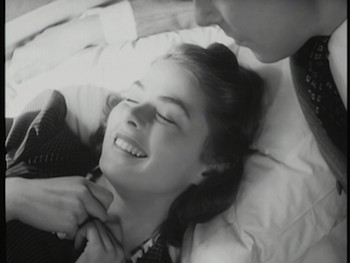
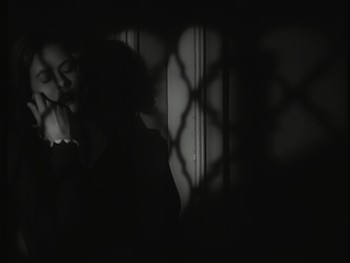
(June Night; A Woman's Face)
Jamie S. Rich is a novelist and comic book writer. He is best known for his collaborations with Joelle Jones, including the hardboiled crime comic book You Have Killed Me, the challenging romance 12 Reasons Why I Love Her, and the 2007 prose novel Have You Seen the Horizon Lately?, for which Jones did the cover. All three were published by Oni Press. His most recent projects include the futuristic romance A Boy and a Girl with Natalie Nourigat; Archer Coe and the Thousand Natural Shocks, a loopy crime tale drawn by Dan Christensen; and the horror miniseries Madame Frankenstein, a collaboration with Megan Levens. Follow Rich's blog at Confessions123.com.
|
| Popular Reviews |
| Sponsored Links |
|
|
| Sponsored Links |
|
|
| Release List | Reviews | Shop | Newsletter | Forum | DVD Giveaways | Blu-Ray | Advertise |
|
Copyright 2024 DVDTalk.com All Rights Reserved. Legal Info, Privacy Policy, Terms of Use,
Manage Preferences,
Your Privacy Choices | |||||||














